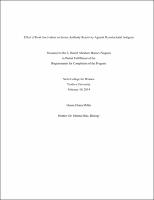Please use this identifier to cite or link to this item:
https://hdl.handle.net/20.500.12202/4062| Title: | Effect of Heat Inactivation on Serum Antibody Reactivity Against Mycobacterial Antigens |
| Authors: | Miller, Deena Eliana |
| Keywords: | Bloodborne infections. Mycobacterial diseases. Viral antigens. Serum. Antigen-antibody reactions. Communicable diseases --Transmission. Microbiological laboratories --Safety measures. |
| Issue Date: | Feb-2014 |
| Publisher: | Stern College for Women |
| Abstract: | Background: When studying antibodies (Abs) in human samples it is critical to deactivate bloodborne pathogens such as HIV or other viruses to avoid the risk of exposure. Common methods to deactivate viruses are UV radiation, heat inactivation or incubation with Triton X. While treatment with Triton X can be cumbersome and time-consuming, and treatment with UV light inaccessible, heat inactivation is more practical and time-efficient. In general, heat inactivation is believed to have little impact on the structure or function of Abs although some studies have generated controversial results. The objective of this study was to investigate the impact of heat compared to Triton X or no treatment on the serum Ab reactivity against different mycobacterial antigens, two proteins and a polysaccharide. Methods: Serum samples (n=38) from HIV- patients with and without active tuberculosis (TB) were tested by ELISA for IgG, IgG subclasses, IgA and IgM against the two immunodominant mycobacterial proteins MPT51 and malate synthase (MS), and the capsular polysaccharide arabinomannan (AM). The 96 well plates were coated with antigens and then blocked with either 3% BSA or 1% milk. Sera were untreated or inactivated for infectious agents with either 1% Triton X-100 or heating at 56°C for 30 minutes and diluted 1:50 in 0.3% BSA or 0.1% milk. We further evaluated the effect of heat on several murine monoclonal Abs (mAbs). Results: IgG reactivity against the two proteins MS and MPT51 was significantly increased in the heat treated versus untreated samples for both TB+ and TB- control subjects (p<0.0001). By contrast, no clinically meaningful differences in IgG reactivity against the proteins were observed between Triton X and untreated samples. The increased IgG reactivity of the heat treated samples, which with several samples was further increased when blocking milk with 1% milk instead of 3% BSA (p=0.02) was reversed when adding 0.1 % milk instead of 0.3 % BSA to the serum dilution buffer. No Ab reactivity was observed when plates lacked proteins and were only blocked with 3% BSA. Interestingly, no significant influence of heat was detected for IgG reactivity against AM. Significantly increased reactivity of the heat treated compared to untreated samples against MPT51 was also observed for IgA and IgM but to a lesser extent (p<0.0001). Furthermore, heat treatment also increased the reactivity of the mAbs 3EF (IgG1 and IgG3), 16A1 (IgG1) and 16A6 (IgG1) against MPT51 and glucuronoxylomannan (GXM) while it had no effect on some other mAbs such as 8F3 (IgG1) and 10F4 (IgG1) against edema factor (EF) and (PA). 5 Conclusions: Heat treatment of sera leads to an increased Ab reactivity that is non- specific, depends on the target antigen, and affects certain Ab isotypes and IgG subclasses more than others. Thus, heat inactivation should be avoided in serological studies. |
| Description: | The file is restricted for YU community access only. |
| URI: | https://hdl.handle.net/20.500.12202/4062 https://ezproxy.yu.edu/login?url=https://repository.yu.edu/handle/20.500.12202/4062 |
| Appears in Collections: | S. Daniel Abraham Honors Student Theses |
Files in This Item:
| File | Description | Size | Format | |
|---|---|---|---|---|
| Deena Miller.pdf Restricted Access | 414 kB | Adobe PDF |  View/Open |
This item is licensed under a Creative Commons License

